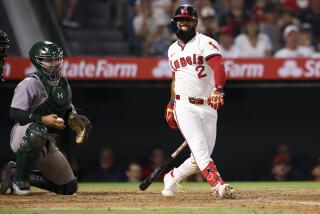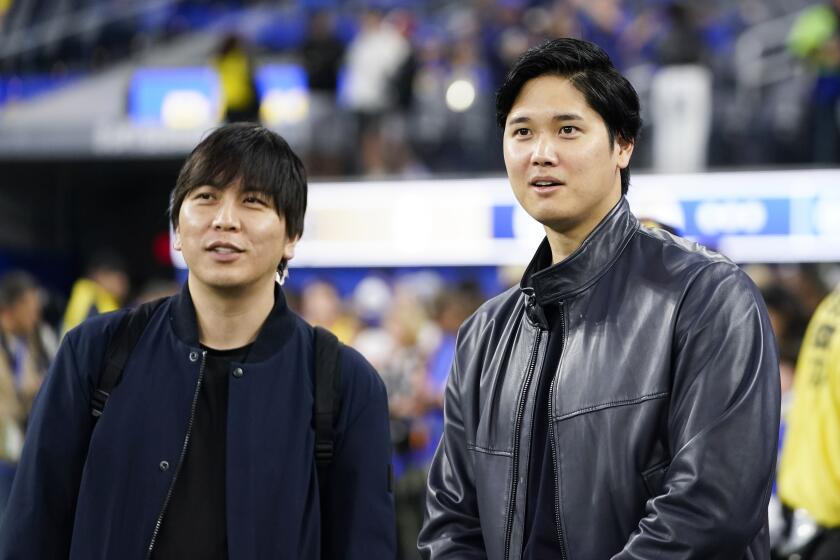Angels Can’t Change Pace
In the clubhouse, a collective yawn. After weeks of anticipation, the Angels finally made their big trade Wednesday, a deal greeted with shrugs and nods in the clubhouse, not cartwheels and ovations.
“I don’t notice anything different in here,” Darin Erstad said. “It doesn’t feel any different.”
In the front office and among the players, the Angels insisted they were good enough to win the American League West without any roster additions. But all the moves--outfielder Alex Ochoa coming in trade, catcher Bengie Molina coming off the disabled list, catcher Jorge Fabregas going and infielder Jose Nieves expected to follow--counted for nothing on the scoreboard.
And nothing on the scoreboard was exactly what the Angels produced for seven innings Wednesday at Edison Field. By the time Troy Glaus hit a home run in the eighth inning, the Boston Red Sox had two runs, good enough for a 2-1 victory that moved the Red Sox into a tie with the Angels in the American League wild-card race.
The Angels also dropped two games behind the Seattle Mariners in the AL West. In losing two of three games to the Red Sox, the Angels lost a series for the first time since July 2-4.
One night after Pedro Martinez dazzled the Angels with his fastball, Tim Wakefield did the same with his knuckleball, a 1-2 punch that can throw off a hitter’s timing for days. And, after five innings Wednesday, the Red Sox replaced Wakefield with a parade of hard-throwing relievers--Rolando Arrojo, Alan Embree and Ugueth Urbina--forcing the Angel hitters to adjust from 70-mph pitches to 95-mph pitches.
Rookie John Lackey pitched heroically for the Angels, giving up one run in 6 1/3 innings. In the eighth inning, the Red Sox added an unearned run. The Angels started the week with the fewest errors of any team in the league, but they made three Tuesday and two more Wednesday.
Earlier, not long before the 1 p.m. trading deadline, the Angels acquired Ochoa from the Milwaukee Brewers in a five-player deal. The Angels sent Fabregas, the only other major leaguer in the deal, to Milwaukee.
If the Angels lose one of their starting outfielders to injury, then Ochoa will become a vital replacement, because their outfield depth evaporated with injuries to Jeff DaVanon and Julio Ramirez.
For now, though, the Angels will use Ochoa in a variety of roles--right-handed pinch-hitter, pinch-runner, occasional right fielder. That makes Ochoa a nice-to-have player, not a must-have player, as his new teammates pointed out.
“The one area we could maybe have used a little help in was the bench, and we got a solid bench player,” Jarrod Washburn said. “If we wouldn’t have made a trade, I would have been happy with that.”
Said Tim Salmon: “It isn’t big, earth-shattering stuff. I don’t know if it’s something we needed. But it strengthens us, no doubt, and gives us some depth on the bench.”
Salmon figures to be the outfielder most affected. When Ochoa starts, he is expected to do so most often in right field. That means even more time for Salmon at designated hitter, not his preferred assignment.
“I’ve gotten to the point where I’ve accepted it,” he said. “I recognize it’s what’s best for the club.”
The Angels, concerned about altering clubhouse chemistry, made sure Ochoa had a similar attitude before completing the trade. “We’re kind of an ego-less club,” General Manager Bill Stoneman said. Erstad, the team leader, said he didn’t know much about Ochoa other than that he was a “good guy.”
Nieves had a good attitude too, even as he was on the brink of losing his roster spot. The arrival of Ochoa, expected today, makes the seldom-used Nieves expendable, but Wednesday he was just hoping he could stay and play with the Angels.
“This is a company, and I’m one of the employees,” Nieves said. “I’d like to play more, but it’s not like I’m demanding anything. I know my role.”
More to Read
Go beyond the scoreboard
Get the latest on L.A.'s teams in the daily Sports Report newsletter.
You may occasionally receive promotional content from the Los Angeles Times.







